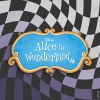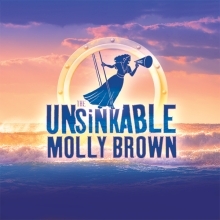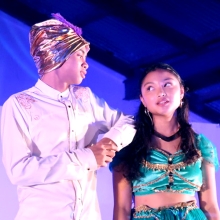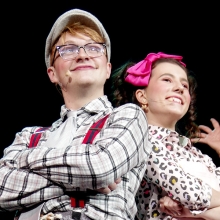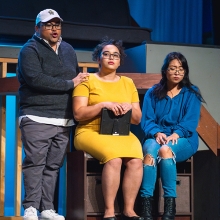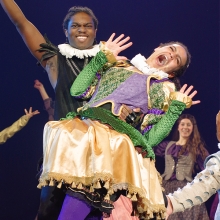"Better Than Before": Reaching New Heights with Next to Normal
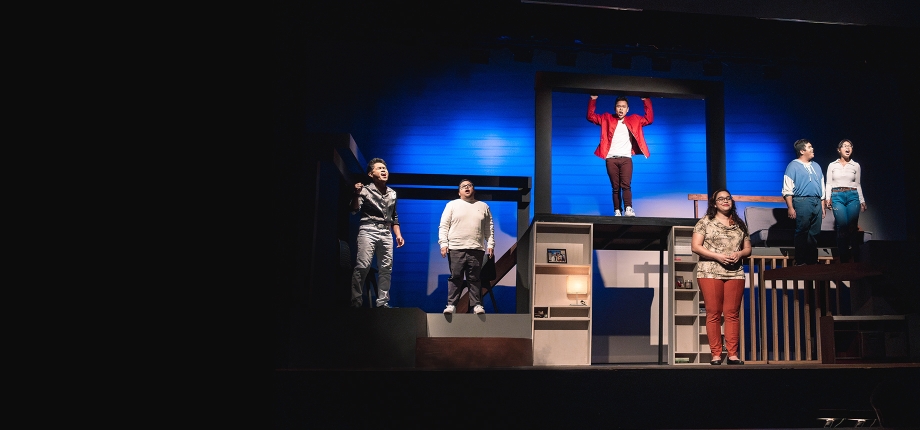
"Better Than Before": Reaching New Heights with Next to Normal
Last November, the University of Guam Theatre brought the Tony and Pulitzer-winning Next to Normal to life onstage. Taking on such an emotional powerhouse of a show is no easy feat for an actor, but the cast rose to the occasion.
Next to Normal takes audiences into the minds and hearts of the Goodman family: Dad's an architect; Mom rushes to pack lunches and pour cereal; their daughter and son are bright, wise-cracking teens, appearing to be a typical American family. And yet their lives are anything but normal because the mother has been battling bipolar disorder for 16 years.
In honor of AAPI Heritage Month, we asked the cast to share their experience with us. Both before and during the two-week run, they pushed themselves artistically while tackling a challenging score - and some power outages.
Note: this piece contains "spoilers" for those unfamiliar with the show.
How did this show appeal to you?
Kalani Marie Mendiola Sisson (Diana): At the time of auditions, the only thing I knew about this show was that it centered around mental health. That alone was appealing enough for me to audition.
RD Gibson (Dan): To be honest, I wasn't familiar with Next to Normal prior to auditions. After sitting down with the libretto and script and listening to the music, I was drawn to the stories of the Goodman family - all of them.
Kayla Del Rosario (Natalie): My favorite part was the music. I love how each character had their own musical expressions, especially in ensemble pieces. The more we worked on it, the more emotion I could feel us express from what was written.
Stephen John Ramirez (Gabe): I have an undying love for the rock genre, and musical theatre. Those two combined, along with the complexities of each character, are what mainly appealed to me.
Alexandre Vilaflor (Henry): I found out about this show through an audition flyer I saw posted around the University of Guam campus. It stated that the show was a rock musical. I have never done a rock musical before, so I thought I would audition for it. I also found the story of the show to be insanely interesting. I have never done a musical like this before.
Xavier Bryce Pegarido Borja (Doctor Fine/Madden): The story lured me in, and the musical challenge behind the show also inspired me to wanna try something new.
Was there a new perspective you wanted to bring to your production or the characters?
Sisson: Throughout the play, you realize that Diana is very much trapped. Trapped in her memories, trapped in her grief, and trapped in the roles that she plays. When she sings "I Miss the Mountains", you learn about her need to be free from all of it. I wanted to highlight this need for freedom in every choice I made as Diana.
Del Rosario: Working on my character Natalie, I didn't want her to seem like a cry baby, feeling like the "forgotten child." I felt that Natalie wanted to showcase her strength and perseverance, not to drown in self-pity.
Ramirez: As Gabe, I was interested in serving Diana's arc as the representation of her demons. Now, that's not really a "new perspective", but I knew I wanted that highlighted more and to really lean in on the "demonic-ness" of Diana's journey, without losing the truth: He is still her SON. He existed. He was alive (even for a bit). He IS alive (to her).
Vilaflor: For Henry, I wanted to convey to the audience his journey throughout the show through each scene. I did this by making a different version of him through each act. So many things happen during the show, and I wanted to show how his character goes from the jazzy stoner to the boyfriend who would do anything for the girl he loves.
What did you discover about yourself while doing this show?
Sisson: This was my first lead role ever. Singing is second nature to me, but bringing a character like Diana to life was extremely intimidating. I doubted myself a lot. Yet somehow, I managed to do the thing I was terrified to do. Through this production, I discovered that I have a potential to thrive in the theater community. I discovered that I am much more capable than I thought, and that I can rise to any challenge that is presented to me. Finally, I discovered a new passion, one that I can envision myself further exploring and pursuing professionally.
Gibson: I learned a lot about allowing myself to be vulnerable on stage. I've done community theater in Guam since I was a young child, and, just like those experiences, I feel Next to Normal and the Goodman family helped me grow as a performer. This show is demanding, and I was so blessed to share in it with a supportive cast and crew.
Del Rosario: I discovered that patience and strength can come hand in hand with tough situations you encounter through life.
Ramirez: Gabe was a part that I never thought I could ever play. I certainly wanted to. I was confident in my capabilities as an actor, but had doubts with my vocal capabilities (something I will continue working on). But as the show evolved and progressed to what it has become, thanks to our director (Troy) and voice director (Rachel), my confidence went up and I felt and still feel that I was able to carry out my objectives. I was happy with my performance.
Vilaflor: Being in this show has made me discover that I am an actor first.
Borja: I discovered that a lot of the irrational fears that I was experiencing during this whole process was just that irrational. it felt gratifying to recover my voice on stage to be able to betray characters again in front of an audience. It has been a couple years since my last big role acting wise and music wise, so jumping back in rediscovering, my love and my talent to sing was very invigorating.
What was the most challenging part of the production?
Sisson: I had a challenging time getting to know Diana as a character… Even more challenging was trying to understand her as a mother, since I don't have any children of my own. It was hard to relate to the unimaginable pain of losing a child, and therefore I struggled to find and portray that "truth" realistically in my performance.
Gibson: The show premiered at the tail-end of the Guam rainy season, and some of the cast members were getting sick, but we were also dodging rotating power outages that stemmed from a Category 4 typhoon that hit a few months prior. One night the power went out twice during our show, but our audience was so gracious, and a majority stayed between outages.
Del Rosario: Figuring out dance moves for "Wish I Were Here" was pretty tough. I'm not much of a dancer and have only had dance training from one other production. Also singing over the band, when being placed in the back corner for most of my singing scenes, was a huge struggle.
Ramirez: The vocals. They were very demanding. But also, as with any other piece, getting to the truth. Speaking for myself as a performer, I tend to do too much that sometimes my objectives in a scene starts to get muddy, thus sacrificing the truth.
Vilaflor: The most challenging part of the show for me was the music. These songs were not easy to perform, but I wouldn't have had it any other way. This show challenged my musical ability, and I am thankful for every moment spent rehearsing and messing up my harmonies. It was definitely worth it in the end.
Borja: There were days where the musical score felt so daunting and other days where I felt I wasn't grasping the character as well as I should, but each time a hurdle presented itself, I overcame with the help of directors, my musical director, as well as my fellow cast mates. I had not performed in over 3 1/2 years… felt like I had much to catch up on and to live up to my amazing cast and crew of the show. Really helped me bring my A-game and helped me step back onto the stage.
What was the most rewarding part?
Sisson: The bigger reward was knowing that I was truly a part of something huge, something important, something bigger than me. I remember there was a night where I was doing some research on the show and I came across a video of "You Don't Know/I Am the One" being performed at the Tony Awards. As I was watching, I had the sudden realization of "Wow…that's going to be me. I'm doing that. We're doing that. A small university from a tiny island is putting together a Tony Award-winning musical." From that point on, every rehearsal and every moment on stage felt like magic to me, a feeling that I'm not going to forget anytime soon.
Gibson: I think the most rewarding part was having the chance to tell Dan's story. I hope I did him justice.
Del Rosario: Being cast as Natalie and having my cast family was the best for me. I was able to perform wonderfully arranged music and sang with very talented performers.
Ramirez: The most rewarding: serving the story well! Everyone did that! Again, thanks to our director and to our voice director who gave us proper guidance and direction. All 6 of our cast members were great, but our directors lead us to where the BEST came out of us.
Borja:The most rewarding thing about the entire process was being able to get back on stage, being able to see the audience cheer and laugh and be really engaged with the content and the show that we were presenting, granted it was a very topic heavy show.
Vilaflor: The most rewarding part of the show was when we got to interact with the audience after each show… Getting to see and hear how the audience felt after watching the show is one of the reasons why I love performing. Knowing that my cast mates and I were able to make the audience feel something made me feel accomplished as a performer.
Photo by Steph Balagot
Share
Callboard
-
Shake and shimmy it with the #Hairspray20Challenge! Join MTI and Broadway Media in celebrating 20 years of #Hairspray. Duet this here or find us on TikTok! Special thanks to @broadwaymedia and @jammyprod. Choreography Guides are a licensor official resource that provides step-by-step instruction from Broadway and professional choreographers for your productions! Visit @broadwaymedia to learn more. #mtishows #youcantstopthebeat #hairspraymusical #goodmorningbaltimore
View on Instagram









